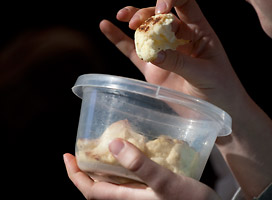

Venture Boldly

Office of Communications
2 East South Street
Galesburg, IL 61401

 The explosion of "fast food" restaurants in the United States during 1950s-60s is more complex than the beginning of an era -- it also marks the end of an era of changes that span most of the 20th century, according to a Knox College faculty member, in a talk celebrating national Food Day on Monday, October 24.
The explosion of "fast food" restaurants in the United States during 1950s-60s is more complex than the beginning of an era -- it also marks the end of an era of changes that span most of the 20th century, according to a Knox College faculty member, in a talk celebrating national Food Day on Monday, October 24.
"The real birth of fast food, the quick service food industry, is rooted in Prohibition," said Nicolaas Mink (photo, right), visiting assistant professor of environmental studies. Mink spoke to students gathered for a brown bag lunch. A scholar of food policy and environmental history, Mink is working on a book, Fast Food: A History, with another, Salmon: A Global History, scheduled for publication in 2012.
"Prior to Prohibition, the great American tradition was 'hospitality' in lodges and saloons... you paid for liquor, but the food was free," MInk explained. "Prohibition shut down 300,000 saloons. One-third re-opened within a year as food sellers. There were now millions of customers entering an urban market for food, and a host of institutional, economic, and technological developments emerged in this new marketplace.."
The first 20th-century revolution in food technology was the steam table, which allowed preparation of food in advance, Mink said. "Then, in the 1920s and 30s, there was a transformation of cooking technology by three things -- refrigeration, high powered griddles and the self-cleaning deep fryer. No one expected the deep fryer to do what it did... By the end of the 1930s, the institutional deep fryer had become the single most important piece of kitchen technology in America."
Finally, in the 50s and 60s, marketers began advertising the theme of "eating out," Mink said, which allowed people to imagine restaurant fare as something entirely different from their normal, daily fare.
"National Food Day has been on our radar for a long time," said the lecturer organizer, Helen Schnoes. Schnoes graduated in 2011 from Knox, summa cum laude with Honors in political science for her research into books by presidential candidates. She received a post-baccalaureate fellowship for additional academic work and volunteer service at Knox this year.
 "Nic's research is not just 'fast food is bad' -- it's more complex than that," Schnoes said. "Having him give a talk for national Food Day engages Knox in the national dialogue about food. It's a starting point for a larger conversation here on campus about ways to improve the food system."
"Nic's research is not just 'fast food is bad' -- it's more complex than that," Schnoes said. "Having him give a talk for national Food Day engages Knox in the national dialogue about food. It's a starting point for a larger conversation here on campus about ways to improve the food system."
As Mink spoke, one of the students in the audience, Rachel Klingler, lunched on her own left-overs -- roasted cauliflower (photo right). "I'm off board, and I like to cook," Klingler said.
Last week, Knox's cafeterias featured a one-day special menu of locally-produced foods, including hamburgers. "Along with local tomatoes and potatoes, we found a local beef producer," Schnoes said. "So much of the local food focus is on produce that sometimes meat gets left out." The local food dinner featured beef patties from Robinson Beef of Cameron, tomatoes from Blue Ribbon Farms of Knoxville, tomatoes and potatoes from Garden of Eloise in Galesburg, and onions from the Local Growers Network.
Last April, Knox Dining Services Director Helmut Mayer received a state Golden Beet Award for boosting the amount of locally grown produce in campus cafeterias.
Published on October 25, 2011